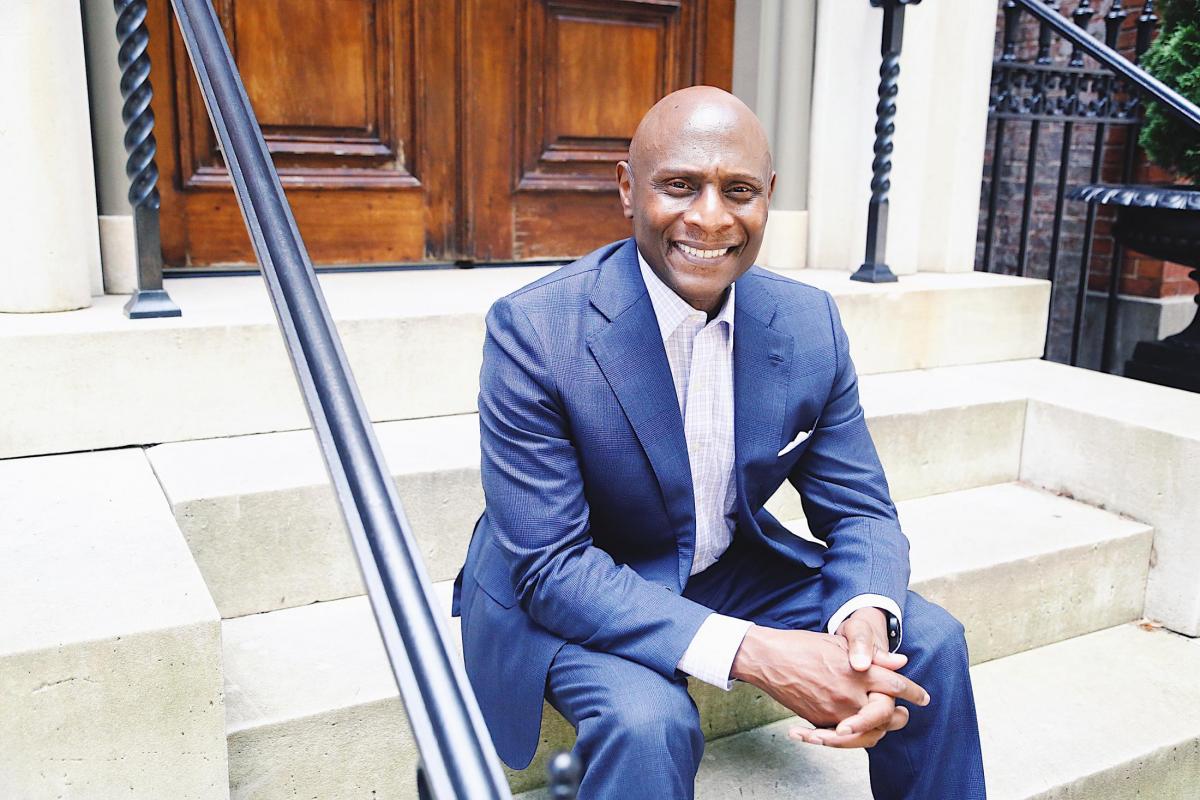
Entrepreneur Bob Wallace believes his roughly 30 years of business experience provide him the skills Baltimore needs in its next mayor. Wallace, an independent and father of five, said he isn’t beholden to party orthodoxy, and if he’s elected as “mayorprenuer” in November, he pledges to secure $1 billion in outside investment in his first term. His bid to be the next mayor, however, is an uphill struggle in a city that’s been dominated by the Democratic Party throughout the past 50 years.
Here’s what Wallace had to say about running as an independent, priority policies, and how his career in business would translate to City Hall.
How long have you been considering running for mayor, and what made you decide to get in the race?
I’ve actually been considering it over the last three election cycles. Every cycle I always think, and hope, that the leadership will take our city to a whole new level. Every time I’ve been disappointed. So this time, given the out-of-control crime that we have in the city, the violence, the poverty, the dysfunction, the distrust between our police force and the communities, the lack of competence in our leadership, I just said enough is enough. We’ve got to do something now, because if we don’t change our leadership we’re going to get to a point of no return, where I think we’ll become a shell of a city.
What makes you think the talents that allowed you to succeed as an entrepreneur will translate to government, which has ostensibly a much different objective than business?
Although the objective may be different between a government and a corporation, I would argue that the mechanics are the same. How do you take limited resources and mobilize, organize, and position them to achieve an outcome? That’s what entrepreneurs do and I would argue that’s what the government does. So my idea of being a “mayorpreneur”—that’s a term that I came up with—I think, is very applicable. In terms of applying the skills of problem solving, bringing people together, and executing on strategy, the idea of giving people hope, and giving them faith, and giving them a destination point that everyone can agree to, and march toward—I believe that those are the skills that the government needs more now than ever before.
So tell us about why you decided to run as an independent? For the last 50 years the Democratic Party has been the dominant party in this city. Why are you running as an independent as opposed to running in one of the party primaries?
I started out as a Democrat. I come from a family of multiple generations of Democrats going back to [President Franklin Delano Roosevelt.] So that’s my base. I’ve also been a Republican because I felt what was missing, especially in the minority community, is economic opportunity. I felt the Republican party, at the time, had a platform that encouraged entrepreneurship, business development, and job creation. I remind people that if you look at the civil rights movement, Dr. King, Malcolm X, and those leaders, you’ll find that their focus pivoted from civil rights—voting rights and basic human decency—to economic rights and opportunities. That was the same path that I’ve taken as African-American leader.
Now I’m an independent because if you look at the Republican Party, and look at the partisan bickering and fighting that goes on, I feel that an independent can get more done as a leader. As an independent, I’m not bound by party doctrine. I’m not bound by party methodologies or stuck to some particular ideas that have never worked. We’ve had Democratic leadership in Baltimore for 40-50 years, and I would ask the people, what have we gotten from that? How has it moved the needle? How has it made Baltimore better? It’s not about parties. What I’ve learned is to put people over profit. To put people over party, and put people over politics. As an independent, I can do just that.
One of the problems that candidates have found when they are not running within the Democratic Party is that it’s hard to get their message to resonate if you don’t have a D next to your name. How do you overcome that?
I’m not the first political leader to go down this path. The first African-American congressman for the 7th District, Parren Mitchell, was a Democrat, but he was not supported by the Democratic establishment. So he had to run as if he was an independent. And he won. Another leader was Judge William H. Murphy Sr., who was the first African-American elected to the [then Municipal Court now District] court in Baltimore. Judge Murphy had a D after his name, but he too was not supported by the Democratic establishment. So he had to run as if he was an independent. He was also successful. [Editor’s Note: Both Mitchell and Murphy won their seats after winning Democratic primary elections.] So I’m not creating a new model here. I’m following in the steps of giants, steps of great men and women.
We have a ground game that most folks don’t realize. I call it “a stealth game” because they think, “Bob Wallace is a businessman and he’s never been engaged at that level.” Well, that’s not true. I’m from Cherry Hill. Most of my employees are from the neighborhoods. My wife’s family, their roots are in East Baltimore and West Baltimore, and there are many of them in the neighborhoods that are supporting us and building a ground game in those areas. So even though I’ve been a business and tech entrepreneur, we have a ground game that is really mobilized and makes a big difference.
If you had to select a top policy priority if you’re elected mayor, what would that be? And where do you think we would get the resources to accomplish that?
I have a seven prong platform, and it’s based upon two tiers. The first consists of crime, education, and jobs. If we get those three things under control, then everything else will flow smoothly from there. One of the reasons businesses do not come to Baltimore City, or that they leave the city, is because of crime and violence. So that’s number one. Then education. In our school system we have 79,000 kids and many of them are not graduating with skills to compete in the job market. That’s unacceptable. Then third is jobs. My goal is to create 100,000 new jobs in Baltimore City in my first term. My Part B of that is to attract $1 billion in new investment to Baltimore City in my first term, because I believe that economic development is going to be key to us building an economy that will lift all people and give everyone the opportunity to be safe and to prosper.
Let’s start with the $1 billion. What do you do to make that happen? A lot of people always say they want to bring things here, but they never seem to show up.
That’s very true, but if you look at my background, I’m a businessman who has built relationships and businesses all over the world. There are some structural changes that need to occur in city government. One is the tax situation. Property tax rates in Baltimore City are double that in other jurisdictions. We’re just not competitive. So if I’ve got money to invest, why would I come to Baltimore when I can get half the tax in surrounding counties? I have a plan that would look at reducing the property tax rate within two tax cycles, about six years. In terms of the resources necessary to do it, there are a couple of possibilities. One is to work with the government to attract state resources to the city. The second is to work with the feds to attract our fair share of federal resources.
But we have another option no one talks about except for me…if you look at the balance sheet of the city of Baltimore, we’ve got about $4.4 billion of assets. So one option we have is to take some of our assets and do a sale leaseback approach to that asset. So let’s say I have a parking garage or some other asset that’s worth $100 million. Why can’t I package that, sell it to investors, lease it back from them over a 20-30 year time period so we get the cash flow we need to operate our city, they get the returns they need to make their shareholders hold, and we get the asset back at the end of the 20-30 year time period? We have options here that we’ve never tried before, to my knowledge, because we haven’t had business-minded leaders in the past.
Baltimore is about 20 years behind Washington, D.C. I believe that if we get the right leadership in Baltimore City—someone who is not afraid to go against what’s been done in the past and says we need to change the structure, we need to disrupt this institution to make this city more attractive to investors, capital, entrepreneurs, and businesses, I believe we will see the same dynamic D.C. experienced and their growth and prosperity.
Baltimore is a great asset. We have wonderful institutions, our cost of living is reasonable, we’ve got great neighborhoods, Johns Hopkins, Morgan State University, University of Maryland. We’ve got so much going for us. What we’re lacking is the leadership in City Hall and a plan. And the political courage to do what’s hard and what’s not popular. I’m willing to do that.
This interview has been edited for clarity and space.
